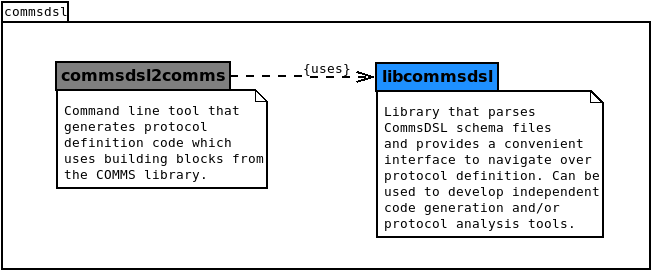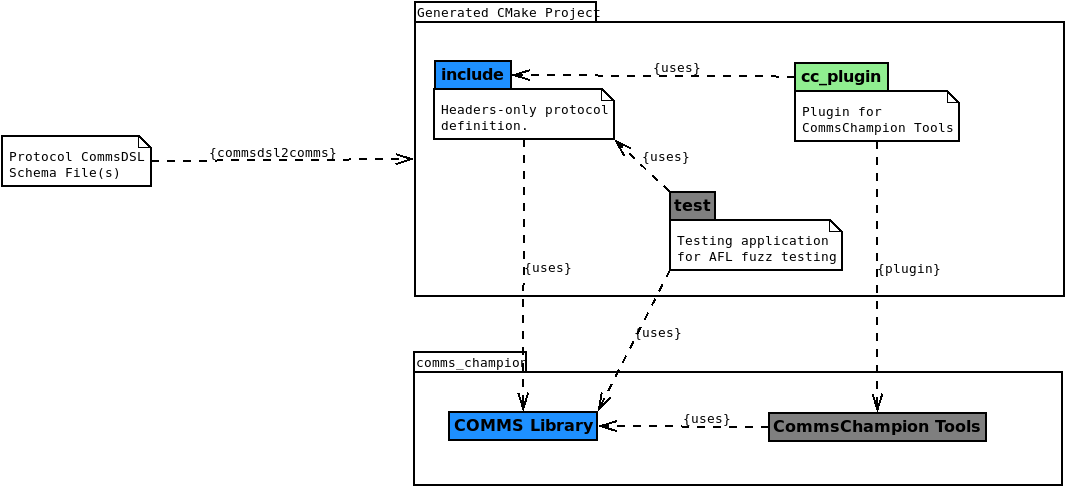What it’s all about
CommsChampion ecosystem is about easy and compile-time configurable implementation of binary communication protocols using C++11 programming language, with main focus on embedded systems (including bare-metal ones).
Interested? Then buckle up and read on.
Motivation
Almost every electronic device/component nowadays has to be able to communicate to other devices, components, or outside world over some I/O link. Such communication is implemented using various communication protocols, which are notorious for requiring a significant amount of boilerplate code to be written. The implementation of these protocols can be a tedious, time consuming and error-prone process. Therefore, there is a growing tendency among developers to use third party code generators for data (de)serialization. Usually such tools receive description of the protocol data structures in separate source file(s) with a custom grammar, and generate appropriate (de)serialization code and necessary abstractions to access the data.
The main problem with the existing tools is that their major purpose is data structures serialization and/or facilitation of remote procedure calls (RPC). The binary data layout and how the transferred data is going to be used is of much lesser importance. Such tools focus on speed of data serialization and I/O link transfer rather than on safe handling of malformed data, compile time customization needed by various embedded systems and significantly reducing amount of boilerplate code, which needs to be written to integrate generated code into the product’s code base.
The binary communication protocols, which may serve as an API or control interface of the device, on the other hand, require different approach. Their specification puts major emphasis on binary data layout, what values are being transferred (data units, scaling factor, special values, etc…) and how the other end is expected to behave on certain values (what values are considered to be valid and how to behave on reception of invalid values). It requires having some extra meta-information attached to described data structures, which is not sent over I/O link, but still needs to be accessible in the generated code. The existing tools either don’t have means to specify such meta-information (other than in comments), or don’t know what to do with it when provided. As the result the developer still has to write a significant amount of boilerplate code in order to integrate the generated serialization focused code to be used in binary communication protocol handling. There is an article called Communication is more than just serialization which provides more detailed examples on the mentioned shortcomings.
All of the available schema based binary protocols generation solutions have multiple limitations, such as inability to specify binary data layout or customize data structures used in the generated code. They also are unable to provide and/or customize polymorphic interfaces to allow implementation of common code that can work for all the message objects. Most available tools don’t provide an ability to customize and/or use multiple transport frames for the same messages, but transferred over different I/O links. Few (if any) allow injection of manually written code snippets in case the generated code is incomplete and/or incorrect.
The generalization is hard. As the result many embedded C++ developers still have to manually implement required communication protocol rather than relying on the existing tools for code generation.
Solution
CommsChampion ecosystem is there it resolve all the problems listed above. Its main purpose is to allow quick and easy implementation of a custom binary protocol, which may already being defined by a third party, without enforcing any particular data encoding and/or layout. The main philosophy here is that most communication protocols are very similar, but many may have a couple of special nuances, which make it difficult to have “out of the box” complete solution. The ecosystem allows injection of manually written code snippets, which may replace and/or complement any functionality provided by default.
There are multiple parts to the CommsChampion ecosystem. Some are independent, some require other ones to be used as well. The core and major components reside in the comms_champion repository. It consists of the following sub-components:

-
COMMS library is the core component and the basis for the whole ecosystem. It is C++(11) headers only, meta-programming friendly library that allows quick and easy implementation of binary communication protocols using simple declarative statements of classes and types definitions. These statements will specify WHAT needs to be implemented, the library internals handle the HOW part. The library contains multiple “building blocks” that allow easy assembly of the protocol definition. It also allows getting down to a single “brick” level when protocol definition and/or application level customization is required.
-
CommsChampion Tools is a set of applications, which can be used to develop, monitor and debug custom binary communication protocols, that were developed using the COMMS library. All the applications are plug-in based, i.e. plug-ins are used to define I/O socket, data filters, and the custom protocol itself. Such architecture allows easy assemble of various protocol communication stacks. The tools are intended to be used on development PC, and use Qt5 framework for GUI interfaces as well as loading and managing plug-ins.
The COMMS library was developed to allow quick and easy manual implementation of the protocol definition. However, over the years it grew with features and accumulated multiple nuances to be remembered when defining a new protocol. In order to simplify protocol definition work, a separate toolset, called commsdsl, has been developed. It allows much easier and simpler definition of the protocol, using schema files written in XML based domain specific language, called CommsDSL. The commsdsl repository provides the following sub-components:

-
commsdsl2comms application. It generates C++(11) code of the binary protocol definition out of CommsDSL schema file(s). The generated code is simple and easy to read. It uses COMMS library to define all the necessary protocol definition classes and allows compile-time application specific customization of polymorphic interfaces as well as selected storage data structures. The commsdsl2comms application also generates code of protocol definition plugin for CommsChampion Tools and test application suitable for fuzz testing with AFL.
-
libcommsdsl library. It provides a convenient interface to parse and process CommsDSL schema files. The library can be used to implement independent code generation tools, which could be used to generate other independent code, such as bindings to the code generated by the commsdsl2comms application for other programming languages, extra testing, wireshark dissector, etc…
The process of the custom binary protocol definition code is depicted below.

Benefits
-
No enforcing of particular data layout and/or encoding. Easy implementation of already defined third party protocol.
-
Embedded (including bare-metal) friendly. The protocol definition code allows easy application specific compile time customization of polymorphic interfaces and some data storage types. No usage of RTTI and/or exceptions. The usage of dynamic memory allocation may also be excluded.
-
Robust and safe handling of malformed input data.
-
Significantly minimizing amount of boilerplate code required to integrate the usage of protocol definition into the business logic.
-
Allowing injection of custom C++11 code snippets in case the code generated by the tools is incorrect or incomplete.
-
Meta-programming friendly. Most classes define similar and predictable public interface which allows easy compile time analysis and optimizations.
-
Having “out of the box” protocol analysis and visualization tools.
-
NOT using any socket / network abstractions and allowing full control over serialized data for extra encryption, transport wrapping and/or external transmit over some I/O link.
Where to Start
At first, it is highly recommended to read through the available tutorials which cover the most common aspects of the CommsDSL, code generation, COMMS library and their integration.
As the second stage in the learning process it is recommended to read through the CommsDSL specification and COMMS library documentation. The latter contains two major tutorial pages:
- How to Use Defined Custom Protocol - it explains how to customize the protocol definition for the end application needs and how to integrate the protocol definition into the application business logic.
- How to Define New Custom Protocol - it explains how to define custom communication protocol from scratch and can be very useful when it comes to implementing custom code when the generated code is incomplete and/or incorrect.
The third stage is to review the available examples and use them as reference and/or as a testing ground.
Other useful resources are:
- commsdsl2comms Manual - manual of commsdsl2comms utility, explains some command line options and how to inject custom code snippets into the generated one.
- Generated CMake Project Walkthrough - explains a directory structure of the code generated by the commsdsl2comms application.
- How to Use CommsChampion Tools - explains how to use CommsChampion Tools to visualize and debug generated protocol code.
- Testing Generated Protocol Code - explains how to fuzz test the protocol definition with AFL.
Communication
For any personal issue, question or request please send an e-mail.
For any technical question that may be of interest to any other developer as well please consider opening an issue on relevant project on github.
It is also recommended to grab RSS feed of the blog to keep yourself updated with latest news and articles.